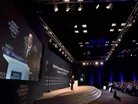World Economic Forum: Day three recap

Friday 5 May marked the last day of the World Economic Forum (WEF) on Africa. Throughout the summit, African Business Review has been recapping on the announcements, ideas, and debates produced by this meeting of global economic leaders.
For our final recap, we summarised the final day of the Forum:
- Africa needs to breed more unicorns. Hear us out – in a discussion on technology, significant African entrepreneurs debated what can be done to produce more African unicorns, i.e. tech start-ups valued at $1 billion. Rapelang Rabana, founder of Rekindle Learning was on the panel. “Innovation is a conviction that something should be better,” said Rabana. “It’s the tool that really helps us close critical gaps in our education and infrastructure.”
- The discussion about youth empowerment continued from day two. Obiageli Katryn Ezekwel, Co-Founder of Transparency International argued that African leaders are cut off from the young populations they serve.
- Likewise, arguments for intra-regional trade resurfaced. Malusi Gigaba, South Africa’s Finance Minister argued that Africa must boost its intra-regional trade and identify new emerging markets on the continent.
- African scientific experts pushed for more research and scientific innovation. A discussion with Thomas Kariuki, Director of African Academy of Sciences, Tolu Oni, Associate Professor in Public Health and other experts highlighted a current dearth of scientific potential on the continent.
- WEF held an inspiring session on Africa’s breakthrough innovators. Oluwayimika Angel Adelaja, a winner of WEF’s search for Africa’s top female tech innovators, spoke about her unique venture, Fresh Direct. Her company builds urban farms in old shipping containers, providing high-tech jobs in the process.
Thus, the World Economic Forum comes to an end with notable ideological solutions for the growth of Africa’s economy. Stand-out solutions include more responsive leadership, investment in youth, inclusion of the poor in economic conversations and greater intra-regional trade.
Can Africa transform such ideological solutions into functional economic policies? We’ll keep you updated…
- How analogous inspiration can solve your strategic deadlockLeadership & Strategy
- Companies are realising a rapid return on AI investmentsTechnology
- Siemens and Microsoft: Driving cross-industry AI adoptionDigital Strategy
- McKinsey’s six strategies for continuous growthLeadership & Strategy
Featured Articles
SAP has announced it has appointed a new President for a newly-created EMEA region, aiming to make the most of the opportunities of cloud and AI technology
Technology giant SAP has expanded its portfolio with the acquisition of LeanIX, a leader in enterprise architecture management (EAM) software
To help businesses achieve increased productivity, Siemens and Microsoft are deepening their partnership by showcasing the benefits of generative AI



